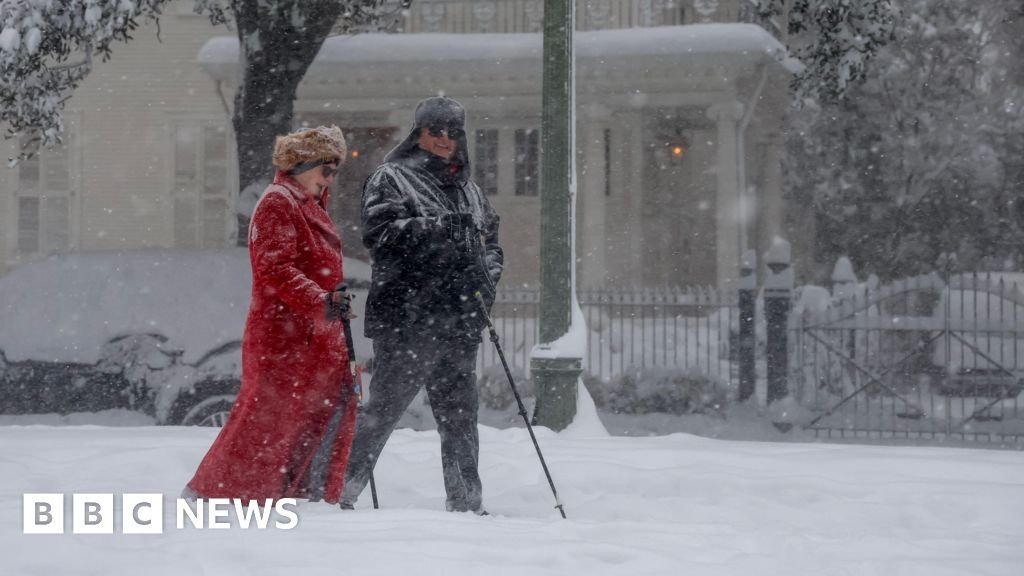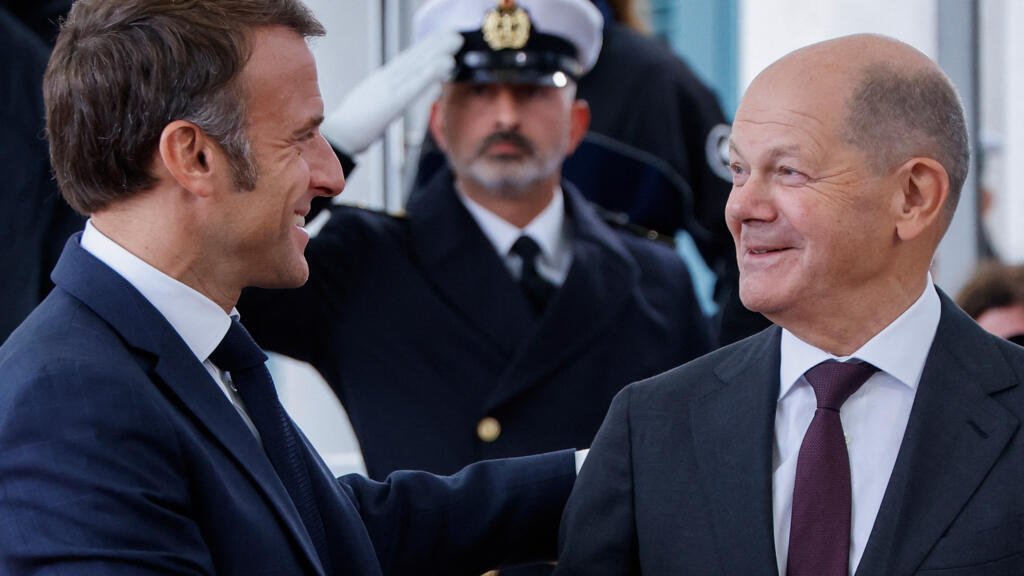
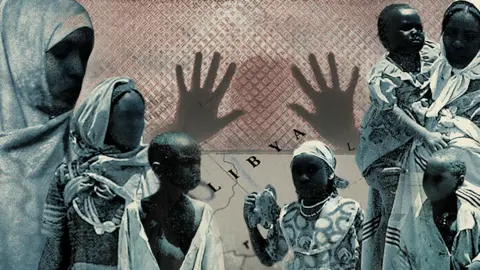 British Broadcasting Corporation
British Broadcasting Corporation“We live in fear,” Laila whispered into the phone so no one could hear. She fled Sudan early last year with her husband and six children to seek safety and is now in Libya.
Like all Sudanese women interviewed by the BBC about their experiences of being trafficked to Libya, her name has been changed to protect her identity.
WARNING: This story contains some potentially distressing details.
In a trembling voice, she explained how her home in Omdurman was attacked during Sudan’s violent civil war that broke out in 2023.
The family first traveled to Egypt before paying traffickers $350 (£338) to take them to Libya, where they were told life would be better and they would be able to find jobs in cleaning and hospitality.
But once they crossed the border, Leila said, traffickers took them hostage, beat them and demanded more money.
She told the BBC: “My son was hit multiple times in the face and required medical attention.”
The traffickers released them three days later without explaining why. Leila thinks her new life in Libya is starting to get better after being reunited with her family try to travel west She rented a room and started working.
But one day, her husband went out to look for work and never came back. Later, her 19-year-old daughter was raped by a man whom Leila met through her work.
“He told my daughter that if her sister told her what he had done to her, he would rape her,” Leila said.
She spoke in a low voice, fearing the family would be evicted if the landlady heard the threats.
Now, Leila said, they are trapped in Libya: they have no money to pay their traffickers to leave and cannot return to war-torn Sudan.
“We barely have any food,” she said, adding that her children were not in school. “My son was afraid to leave the house because other kids were beating him and insulting him for being black. I felt like I was going crazy.”
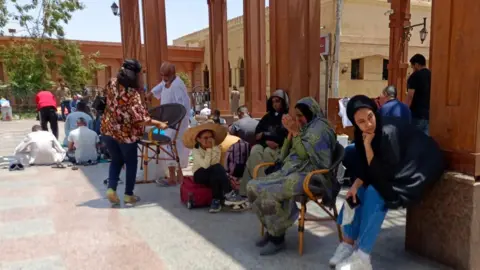 Getty Images
Getty ImagesMillions of people have fled Sudan since war broke out in 2023 between the army and the paramilitary Rapid Support Forces (RSF). Both sides jointly staged a coup in 2021, but a power struggle between commanders plunged the country into civil war.
Experts say that more than 12 million people have been forced to leave their homes, the famine has spread to five regions, and 24.6 million people (about half of the total population) are in urgent need of food aid.
The United Nations refugee agency says there are more than 210,000 Sudanese refugees in Libya.
The BBC spoke to five Sudanese families who originally traveled to Egypt, where they said they experienced racism and violence before moving to Libya, believing they would be safer there and have better job opportunities. We contacted them through researchers on migration and asylum seekers in Libya.
Salma told the BBC she was already living with her husband and three children in Cairo, Egypt, when Sudan’s civil war broke out, but migrant conditions there worsened as large numbers of refugees entered the country.
Salma said they decided to move to Libya, but what awaited them was “hell on earth.”
She described how once they crossed the border, they were placed in warehouses run by traffickers. The men wanted money up front to be paid to traffickers on the Egyptian side of the border, but the money never arrived.
Her family stayed in the warehouse for nearly two months. At one point, Salma was separated from her husband and taken to a room for women and children. Here, she said, she and her two eldest children were subjected to various forms of violence because they wanted money.
“Their whips left marks on our bodies. They would beat my daughter and put my son’s hands in a lit oven while I watched.
“Sometimes I wish we all died together. I can’t see any other way out.”
Salma said her son and daughter were traumatized by the experience and have suffered from urinary incontinence ever since. Then she lowered her voice.
“They would take me to a separate room, the ‘rape room,’ with a different man each time,” she said. “I’m the child of one of them.”
Eventually, she raised some money through a friend in Egypt, and the traffickers freed her family.
She said doctors then told her it was too late to have an abortion and when her husband found out she was pregnant, he abandoned her and the children, leaving them sleeping rough, eating leftovers from bins and walking in the street begging.
They took refuge on a remote farm in northwestern Libya for a while, with little food to eat. They quench their thirst by taking a sip of nearby contaminated water.
“It breaks my heart to hear my (eldest) son say he’s starving to death,” Salma said by phone, as a baby’s cries grew louder in the background.
“He was so hungry,” she said, “but I had nothing, not even enough milk in my breasts to feed him.”
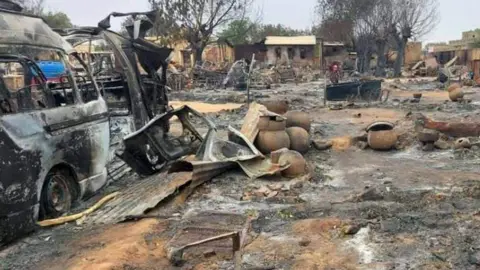 Getty Images
Getty ImagesJamila, a Sudanese woman in her 40s, also believes reports from the Sudanese community that a better life awaits them in Libya.
She fled unrest in Sudan’s western Darfur region in 2014 and spent several years in Egypt before moving to Libya in late 2023. Since then, she said, her two daughters have been raped multiple times – the first time they were 19 and 20 years old.
“I sent them on cleaning duties while I was ill; they came back at night covered in dirt and blood – four men raped them until one of them passed out,” she told the BBC.
Jamila said she was also raped and held captive for weeks by a much younger man who offered her a job cleaning houses.
“He once called me a ‘disgusting black person.’ He raped me and said, ‘This is what women are made for,'” she recalled.
“Even the children here are mean to us. They treat us as beasts and wizards. They insult us for being black and African. Aren’t they themselves African?” Jamila said.
When her daughters were raped for the first time, Jamila took them to hospital and reported the incident to the police. But when the officer realized they were refugees, Jamila said he withdrew the report and warned her she would be jailed if a formal complaint was filed. This is in western Libya.
Libya is not a signatory to the 1951 Refugee Convention or the 1967 Protocol Relating to the Status of Refugees and considers refugees and asylum seekers “illegal immigrants.”
Human rights group Libya Crime Watch said the country is divided into two parts, each run by a different government, but the situation is easier for migrants in the east because they can make formal complaints without being detained and have easier access to Medical services.
While sexual violence is common in unofficial facilities run by traffickers, there is also evidence of abuse in official detention centers in Libya, particularly in the west.
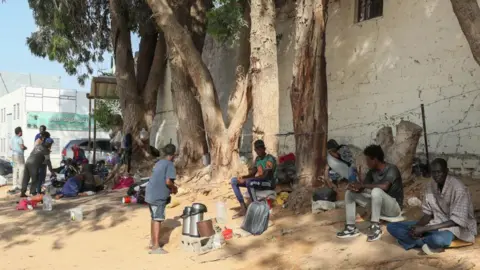 Getty Images
Getty ImagesHana, a Sudanese woman who collected plastic bottles from bins to feed her children, said she was abducted in western Libya and raped at gunpoint by a group of men.
The next day, her attackers took her to a facility run by the state-funded Stabilization Support Agency (SSA). Hana was not told the reason for her detention.
“While I watched, young men and boys were beaten and forced to strip naked,” Harner told the BBC.
“I stayed there for several days. I slept on the bare floor with my head on plastic slippers. After several hours of begging, they would make me go to the toilet. I was beaten on the head multiple times.”
There have been multiple reports of migrants from other African countries being mistreated in Libya. The country is a key stepping stone to Europe, although none of the women interviewed by the BBC planned to travel there.
In 2022, Amnesty International accused the SSA of “unlawful killings, arbitrary detentions, interceptions and subsequent arbitrary detentions of migrants and refugees, torture, forced labor and other egregious human rights violations and crimes against international law.”
The report states that interior ministry officials in the capital, Tripoli, told Amnesty International that the ministry has no oversight of the SSA because it takes orders from Prime Minister Abdul Hamid Dbeibé, but his office did not respond to our request for comment. .
Libyan Crime Watch told the BBC that systematic sexual abuse of migrants takes place in official immigration detention centres, including Tripoli’s notorious Abu Salim prison.
Doctors Without Borders (MSF) said in a 2023 report that there were “increasing numbers of reports of sexual and physical violence, including systematic stripping and intimate searches, as well as rape” in Abu Salim.
The interior minister and Tripoli’s anti-illegal immigration unit did not respond to CNN’s requests for comment.
Salma has now left the farm and moved into a new room with another family nearby, but she and her family still face the threat of eviction and abuse.
She said she couldn’t go home because of what happened to her.
“They would say I brought shame to my family. I’m not sure they would welcome my body,” she said. “If only I had known what awaited me here.”
You may also be interested in:
 Getty Images/BBC
Getty Images/BBC
